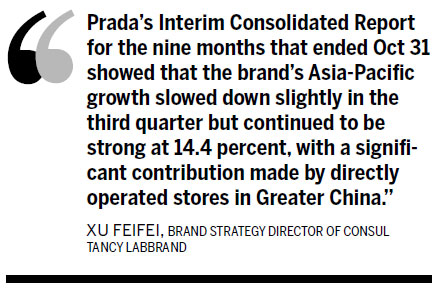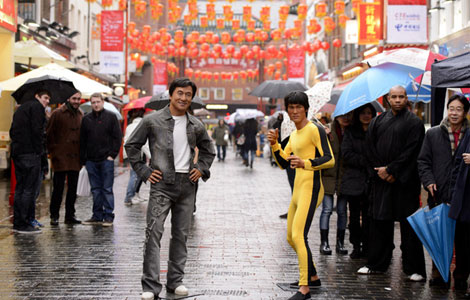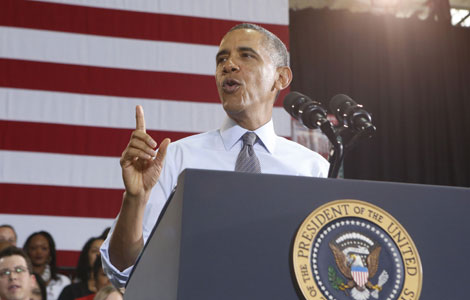Foreign retailers learning how to click with Chinese fashionistas
Updated: 2014-02-05 07:52
By He Wei in Shanghai (China Daily USA)
|
|||||||||
Popularity of cross-border online shopping rising among urbanites
Chinese bargain-hunters spent a record amount with domestic Internet retailers during last year's Double 11 sales, but they are eyeing a new marketplace overseas.
"Cyber Monday" and "Black Friday" are no longer unfamiliar terms to China's price-savvy middle class. A growing number of English-speaking credit card holders have joined the international fray.
"It's quite simple. You just register an account, pick out the goods, choose a form of delivery and pay for it," said Chen Chengzi, a regular at overseas online shopping.
The popular trend of cross-border online shopping is being spearheaded by a number of shopaholics who understand how to buy things overseas. They usually choose items with price differences or things that tend to be unattainable in China.
The e-commerce landscape has also attracted foreign brands that are extending their footprints via online stores to capitalize on the fertile international market.
For example, a drive to win new fashion-conscious customers via the Internet helped Spain's Inditex SA, owner of the Zara brand, to deliver an enviable first-half balance sheet.
Zara has undertaken a big online push since 2010, starting in its home country Spain and spreading to other European countries. Last year, it also launched e-commerce sites in the United States and Japan.
In addition, such fast-fashion brands as H&M, US retailer Gap Inc and Japanese brand Uniqlo also have sought to enter China's e-commerce sector over the past two years.
However, each company has chosen a different approach.
Zara said it hired a group of experts that monitors its global logistics system to ensure that any order received from China would be handled directly by its Spanish headquarters.
Unlike Zara, which operates its website entirely on its own, Uniqlo chose to outsource part of that operation to third-party vendors.
Upon payment, for example, users are redirected to a page tailor-made by Alibaba Group's most popular online marketplace, where transactions and deliveries are fulfilled through the Taobao channel.
Meanwhile, Gap has a hybrid model, with a self-run website on the platform of Tmall.com, the business-to-consumer branch of Alibaba.
A rapid pickup in overseas online purchases has been steered by a policy change allowing third-party payment platforms to offer cross-border consignments.
The green light given by the China State Administration of Foreign Exchange last year enabled people to handle foreign sales and make business purchases.
Chinese consumers can buy products on international websites using domestic third-party payment platforms. There is no need for them to worry about dual-currency credit card issues.
Improvements in logistics also have played a major role.
Shipping products directly from an online shop's main warehouse can be costly for both buyer and the seller. But intermediary logistics firms have come to the rescue.
Foreign fashion brands have to integrate fast search functions, offer popular promotions and, most important, launch China-specific products that are unique to the sites, said Burghardt Groeber, vice-president of Hybris AG's Asia-Pacific branch in Hong Kong, a provider of multichannel commerce software.
"What we are seeing is a growing tension between an authorized site on Tmall and the company's original site. If merchants sell certain items only through the original channel, there will be less dependency on Tmall in the long run," he said.
Parallel channels
According to consultancy Bain & Co, more than 50 express firms offer shipping to China, boosting the increase of "Daigou", or parallel channels for overseas shopping.
Almost 60 percent of consumers have made at least some luxury purchases through parallel channels via either Taobao or other buyer agencies and websites rather than from original brands or department stores.
When shoppers buy on a foreign website, they can fill in a local address offered by the courier and transfer the products back to China.
The courier makes a tidy profit on shipping fees and commissions.
Two differing rationales are behind the Daigou spree, according to Xu Feifei, brand strategy director of consultancy LabBrand.
"For luxury products, one major driving force is product prices; Daigou prices are usually cheaper than those in China. For products such as cosmetics, skin care, medicine or baby-related goods, consumers sometimes are willing to pay more money for Daigou, as they are looking for reliability and reassurance," Xu said.
Chinese shoppers constitute 29 percent of the world's luxury spending, according to the latest China Luxury Market Study by Bain.
But sales within China accounted for just 7 percent, indicating that most of such purchases are taking place overseas.
For luxury brands, there are two channels that attract very different types of consumers.
Online and overseas retailers generally lure middle-class shoppers, especially those in first- and second-tier cities, who care about value for money and about quality.
Luxury brick-and-mortar stores, meanwhile, tend to be designed more for the very wealthy or for gift-givers seeking social status.
Although sales in these stores have experienced a slight slowdown from previous years, they are still growing, Xu noted.
"For example, Prada's Interim Consolidated Report for the nine months that ended Oct 31 showed that the brand's Asia-Pacific growth slowed down slightly in the third quarter but continued to be strong at 14.4 percent, with a significant contribution made by directly operated stores in Greater China," she said.
During the weeklong National Holiday, Chinese shoppers spent an average of $12,800 in London, more than the former record-holders from oil-rich Middle East countries, according to the Daily Mail.

Stories of conspicuous consumption by Chinese visitors also abound in Rome, Milan and other European locales, including Liechtenstein, a tiny principality between Austria and Switzerland that is a member of the European Free Trade Association.
South Korea also has risen to become a hot spot for Chinese outbound spending, thanks to its geographical proximity and latest fashion lineups, according to the United Nations Tourism Organization.
The overriding image of Chinese tourists on Jeju island in South Korea is one of busloads of shoppers heading for the luxury boutiques in the Shilla duty-free shop, said Quan Yuefang, a tour guide with Nanjing-based Tuniu.com, an online travel agency.
"South Korea is becoming a new shopping darling for Chinese, notably those from eastern China who are tired of trips to Hong Kong or Southeast Asia," said Quan, who has led trips to the country for five years.
A growing number of approved destination status agreements, a strong yuan and a speedier visa process - even a visa-free policy, in the case of Jeju - are luring price-savvy middle-class earners, Quan said.
To gain traction, traditional sales channels for luxury brands should build a personalized experience and emotional connection with Chinese customers, Xu said
"Chinese consumers are continuing to be strong luxury goods purchasers, whether buying online through Daigou or visiting shops.
"But these consumers are becoming more sophisticated and going beyond simply showing off logos. They seek brands that demonstrate an understanding of and a respect for their needs, especially the brick-and-mortar stores," she noted.
hewei@chinadaily.com.cn
|
Zara hired a group of experts that monitors its global logistics system to ensure that any order received from China would be handled directly by its Spanish headquarters. The drive to win new Chinese online customers helped Spain's Inditex SA, owner of the Zara brand, to deliver an enviable first-half balance sheet. Akos Stiller / Bloomberg |
(China Daily USA 02/05/2014 page13)
Most Viewed
Editor's Picks

|

|

|

|

|

|
Today's Top News
Data show rebalancing, not weakness: economist
US envoy counsels restraint
Obama to visit Jefferson's estate with Hollande
US braces for falling deficit
US Senate okays ambassador nominee to China
Anti-graft agency to widen net
US Senate passes farm bill
Non-manufacturing PMI drops in Jan
US Weekly

|

|















